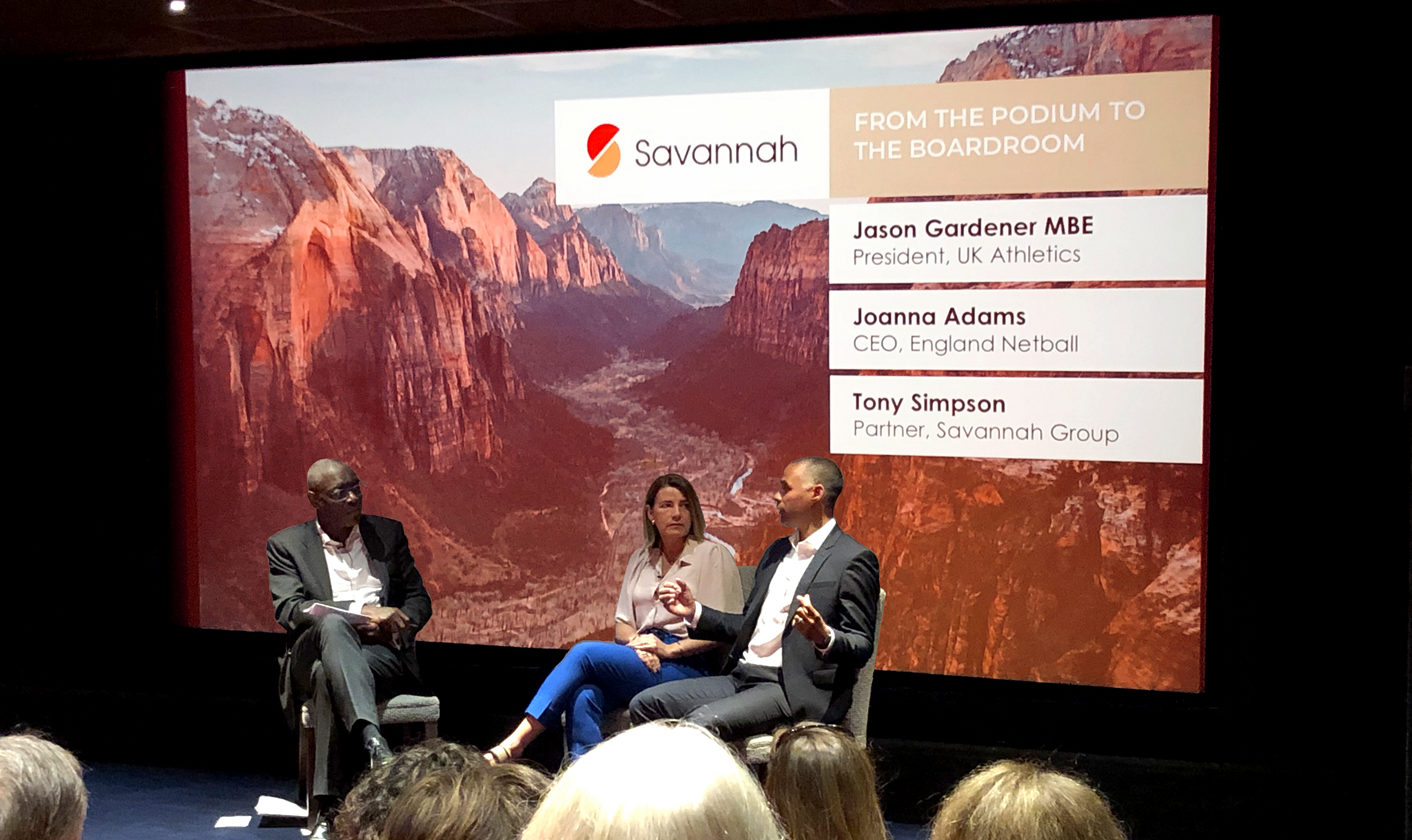Sport and business are often compared to one another, with good reason. In both environments, leaders seek to be top of their game. Yet relatively few have experienced both worlds, to know where parallels lie, and vague generalisations are often made. Given that athletes work in teams to deliver high performance it is useful to learn lessons that can be applied from the sporting world to business to truly help companies to rise to the top.
To gain a unique perspective on the experienced similarities between sport and business, and what business can learn from athletes, Savannah Group recently hosted an event ‘From the Podium to the Boardroom’ for Human Resources professionals. Savannah Group’s Tony Simpson interviewed Jason Gardener, Olympic Gold medallist, and Joanna Adams CEO of England Netball, both of whom have ties to the sporting and business world. This fascinating session shared the raw highs and lows of Jason and Joanna’s journey. Several key insights were gained from the event on preparation, teamwork and high performance which explore the similarities from the podium to the boardroom.
Preparation Is Everything: The Importance Of Teamwork
A key commonality for athletes and business leaders in the preparation for any activity is the importance of teamwork. Both speakers agreed on the necessity of working together for successful outcomes. Jason looked back at the Athens Summer Olympics in 2004, where he won gold in the men’s 4 x 100 relay, teamwork in preparing for the event was everything. One important focus for Jason, in particular, was working on “What if?” scenarios. What if the bus doesn’t turn up? What if you forget your spikes? You’ve got a spare kit. You’ve got that kind of “What if?” scenario. When the team works together effectively to address these points, the right preparations can be made to bring about a greater likelihood of high performance, success, and spirit!
Everyone has an important role to play in driving achievement for the team. It is often said that if you fail to plan, you plan to fail. Scenario planning leads to good preparation and ensuring that all possible likely eventualities are taken into account. This helps each person within the team to understand their role and get ready for the curve balls that could fly in their direction, having a clear idea of what to do in each scenario. Joanna noted that some of the things that they test and check, you sometimes sit there and go, ‘What on earth are you checking that for?’ but it’s always having an alternative answer to something. Even when different roles might seem obscure and scenarios unusual, if all the individuals in the team playing their part, the team can succeed.
The Parallels Between Business And Sport
Succeeding in both sport and business world require hard work. Individuals and teams in both environments need to have passion about what they are doing. Goal setting is an element of similarity between sports and business for achieving lofty goals. Meanwhile, commitment to your craft was also flagged by the pair as being a key area of resemblance between sports and business.
A focus on inclusion and diversity was the main theme arising where parallels exist between sport and business. For Jason, seeing Daley Thompson win the gold medal for the decathlon event in the Summer Olympic Games in 1984 in Los Angeles was a critical turning point. Jason had just won at his own sports day, and having a diverse role model was significant in driving his success. Being able to identify with someone who is like oneself is also very important in business. While there has been some progress towards redressing balance, there is still a lot to be done to ensure that people from different ethnic backgrounds and gender are appropriately represented at the highest levels in business. Jason highlighted that the best person for the job, with the talent to succeed should get the seat at the table, regardless of gender, colour or other differences.
In reviewing commonalities, Joanna was clear to distinguish a noteworthy difference between sport and business, that of control. In sport, there can be limited flexibility due to it being hemmed by red tape. While companies can implement planning, in sports this is less practical and achievable in some respects. Companies might have a bad year, and this could lead to shareholder disappointment, but there are checks and balances that can be made, and controls to allow the business the opportunity to recover. Athletes are affected by a wide variety of variables that are not under the leader’s control, such as team members getting food poisoning, as just one example. In sport, if the team does not deliver on the day, it is all over for that team at that time. This is harder to recover from, as the sports team will lose adulation overnight, and confidence erodes.
On Dealing With Expectations And Pressure
It is hard to deny the sort of pressure that athletes are put under, and especially to succeed in world-class sporting events. Of his time in Athens, Jason related that the pressure was enormous both for him and those around him. People react differently to this, and different responses are hard to control or prepare for. Going for gold in business may also feel as if it places a lot of pressure on people. This can lead to people making mistakes, which can be seen in both environments. The important thing is to learn from errors and make changes to avoid them happening again. Joanna highlighted that people are fallible and that this is entirely normal. For her, helping people to succeed is all about building them up and helping them to have confidence, despite their mistakes. This helps to better meet expectations of oneself and others.
Expectations may not always be met, and this is something that both business leaders and athletes must prepare for. For the 1998 Commonwealth Games in Kuala Lumpur, Gardener made the squad but was ultimately not selected as part of the team that ran, and that won the gold medal. While he got to celebrate with the team when they won, he was not on the podium to collect a medal from the team. While watching from the back of the stadium he was delighted for the team but very disappointed in himself, and sad not to be a part of it. This drove an important change in him and one that can also be channeled in business. He decided that he would never find himself in that position again. Today he works hard to ensure he is always in the starting team, and never on the bench. Employees can be coached to take the same approach to disappointment, to help them focus their energy on moving forward and future possible success, rather than dwelling on disappointment and failure.
Building High-Performance Teams
The make-up of high performing teams is likely to be primarily of high performing people. While some people may have the genetics to help them succeed in sport, a person needs something more to actually reach the top of their game. While there have been nurture versus nature debate in the leadership research literature, it is generally accepted that genetics are not everything in succeeding at work. Those that can learn to perform to a high standard in business are likely to be top of the list for selection.
Tony issued a word of caution by highlighting that the best performers are not necessarily the right people to be part of high-performance teams, and Joanna outlined the importance of this on the netball court, explaining that what is needed is seven people who will gel as a team. Just as in business, the right person for the team is likely to not be the person who is a high performer but who can work in a team environment. Toxic influences can damage a team’s potential to achieve, so it will be better to select a team player who can work well with others for the good of the team, over a high performer. In sports, there is somewhat more flexibility for removing poor performers. The team may naturally deselect the person. In business this is naturally harder, as getting rid of poor performers will usually require performance management and adherence to the law. This makes getting it right first time in business all the more important.
High-performance teams must have the right leader in place. While one individual might have more exposure, another might be more appropriate for the job. Just because a person is in the limelight does not mean they have the right mix of skills and experience to captain a team, and the same is true in companies too. A person who is popular might have been great in the past, but might no longer be the right person for the job, or there might now be a more optimal choice. This can create shockwaves but managed in the right way, the team will bounce back.
In Closing
While not everything about succeeding as an athlete or in business is the same, there are a great number of parallels between the two. Preparation and scenario planning, as well as being a great team player and working towards shared goals. Ultimately, having the drive to succeed and being able to pick oneself up after mistakes, learn from them and move forward are essential to fulfilling personal and team potential.





